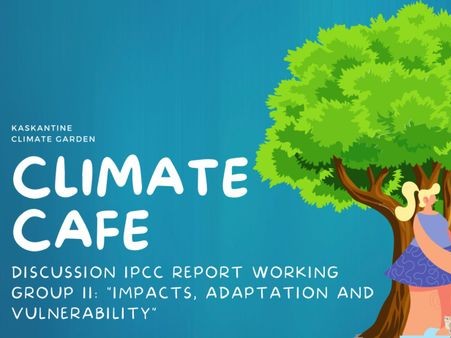Climate Cafe: Discussion IPCC "Impacts, Adaptation and Vulnerability"

Normally with the Climate cafe, we have an open agenda but for March we would like to talk about the recently published IPCC report Climate Change 2022: Impacts, Adaptation and Vulnerability, which has sent another shockwave through the media of realization about the state of the planet.
Especially we would like to discuss the general key findings of proposed adaptation strategies in Europe (see for the regional factsheets https://www.ipcc.ch/report/ar6/wg2/about/factsheets)
Because the incredible good news that is packed in the gloom and doom picture of the report is that we can choose strategies that at the same mitigate climate change and build up a general resilience of earth’s ecosystems and human production systems, including our built environment but also the agricultural production, energy and water management systems.
The report summarises four key risks that we have to deal with in Europe, and that will affect us a long time even when we attain the 1,5C goal, and that affect the Mediterranean region especially severely. They call this the stage of “overshoot”.
Heat as a health hazard
Diminished agricultural production
Water scarcity
Flooding
Now the good news is that addressing those risks will make us more resilient and sustainable.
Ad1: We need behavioral change combined with building interventions, space cooling, and urban planning to manage heat. This will at the same time make the built environment circular and almost independent of fossil fuels.
Ad2 We need irrigation, vegetation cover, changes in farming practices, crop and animal species, and shifting planting; This will make agriculture at the same time much less dependent on fossil fuels, and other chemical inputs, and will protect the soil from erosion and drought.
Ad3and4: We need water efficiency improvements, water storage, water reuse, early flood warning systems, reserving space for water and ecosystem-based adaptation, sediment or engineering-based options, land-use change, and managed retreat.
This will give us a completely sustainable and nature-friendly water management system.
Discussion questions In which of these strategies you see most of the win-win advantages, where do you see barriers to make use of those win-win advantages, and how do you see we can take away those barriers?
IPCC resources
This is what the report says itself has to say about the barriers and residual risks:
Key-Barriers Key barriers are limited resources, lack of private sector and citizens, engagement, insufficient mobilisation of finance, lack of political leadership, and low sense of urgency. Most of the adaptation options to the key risks depend on limited water and land resources, creating competition and trade-offs, also with mitigation options and socio-economic developments.
Residual risks In many parts of Europe, existing and planned adaptation measures are not sufficient to avoid the residual risk, especially beyond 1.5°C GWL (high confidence). Residual risk can result in losses of habitat and ecosystem services, heat related deaths, crop failures, water rationing during droughts in Southern Europe, and loss of land (medium confidence). {ES-Ch13}
Climate Resilient Development Closing the adaptation gap requires moving beyond short-term planning and ensuring timely and adequate implementation (high confidence). Inclusive, equitable, and just adaptation pathways are critical for climate-resilient development. The success of adaptation will depend on our understanding of which adaptation options are feasible and effective in their local context (high confidence).
Note 1: We are planning to meet in person at the Kaskantine Garden. But based on the weather forecasts we will announce the definite location just before the event.
Note 2: We understand that life happens and sometimes you won’t be able to join the meetup. However, to allow others the opportunity to join and help the organisers with planning, if you cannot make it, please cancel as early as possible, and at least 24 hours before the event.
After 3 cancellations (changing your RSVP to ‘not-going’) or no-shows, your name will be automatically moved to the waiting list in future meetups. We do this all in good spirit - it will just help us keep the events running smoothly! 😉
